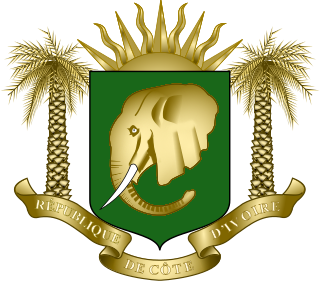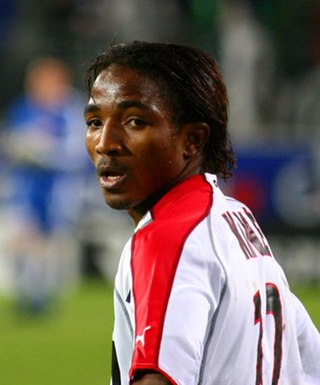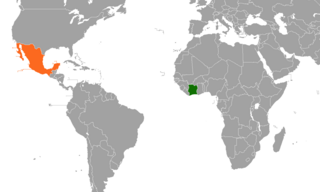 |
|---|
Ivorian Revolutionary Party (French : Parti Revolutionnaire Ivorien) was an Ivorian clandestine opposition group. It existed around 1959.
 |
|---|
Ivorian Revolutionary Party (French : Parti Revolutionnaire Ivorien) was an Ivorian clandestine opposition group. It existed around 1959.
Gbagbo, Laurent: Côte d'Ivoire, Pour une alternative démocratique. Paris: L'Harmattan, 1983.

The Armed Forces of Côte d'Ivoire are the armed forces of Ivory Coast.

Ivory Coast, also known as Côte d'Ivoire and officially the Republic of Côte d'Ivoire, is a country on the southern coast of West Africa. Its capital city of Yamoussoukro is located in the centre of the country, while its largest city and economic centre is the port city of Abidjan. It borders Guinea to the northwest, Liberia to the west, Mali to the northwest, Burkina Faso to the northeast, Ghana to the east, and the Atlantic Ocean's Gulf of Guinea to the south. With 30.9 million inhabitants in 2023, Ivory Coast is the third-most populous country in West Africa. Its official language is French, and indigenous languages are also widely used, including Bété, Baoulé, Dyula, Dan, Anyin, and Cebaara Senufo. In total, there are around 78 different languages spoken in Ivory Coast. The country has a religiously diverse population, including numerous followers of Islam, Christianity, and traditional faiths often entailing animism.

Koudou Laurent Gbagbo is an Ivorian politician who was the president of Côte d'Ivoire from 2000 until his arrest in April 2011. A historian, Gbagbo was imprisoned in the early 1970s and again in the early 1990s, and he lived in exile in France during much of the 1980s as a result of his union activism. Gbagbo founded the Ivorian Popular Front (FPI) in 1982 and ran unsuccessfully for president against Félix Houphouët-Boigny at the start of multi-party politics in 1990. He won a seat in the National Assembly of Côte d'Ivoire in 1990.

The national flag of Ivory Coast is a tricolour flag consisting of equal bands of orange, white, and green. The proportions of the flag are 2:3. It is the national emblem of the Republic of Ivory Coast as affirmed in Article 29 of the Constitution in 1960.

The music of Ivory Coast includes music genres of many ethnic communities, often characterised by vocal polyphony especially among the Baoulé, talking drums especially among the Nzema people and by the characteristic polyrhythms found in rhythm in Sub-Saharan Africa.
The First Ivorian Civil War was a civil conflict in the Ivory Coast that began with a military rebellion on 19 September 2002 and ended with a peace agreement on 4 March 2007. The conflict pitted the government of Ivorian President Laurent Gbagbo against a domestic insurgency led by the New Forces of Ivory Coast. Following the war, a second civil war (2010–2011) would begin over the results of the 2010 Ivorian presidential election.

Alassane Dramane Ouattara is an Ivorian politician and economist who has been President of Ivory Coast since 2010. An economist by profession, he worked for the International Monetary Fund (IMF) and the Central Bank of West African States, and was the Prime Minister of Côte d'Ivoire from November 1990 to December 1993, appointed to that post by then-President Félix Houphouët-Boigny. Ouattara became the president of the Rally of the Republicans (RDR), an Ivorian political party, in 1999.
Hip hop is a major part of the popular music of Côte d'Ivoire, and has been fused with many of the country's native styles, such as zouglou.

Bakari Koné is an Ivorian former professional footballer who played as a winger.

The United Nations Operation in Côte d'Ivoire (UNOCI) was a UN-NATO peacekeeping mission in Ivory Coast whose objective was "to facilitate the implementation by the Ivorian parties of the peace agreement signed by them in January 2003". The two main Ivorian parties were the Ivorian Government forces who controlled the south of the country, and the New Forces, who controlled the north. The UNOCI mission aimed to control a "zone of confidence" across the centre of the country separating the two parties. The Head of Mission and Special Representative of the Secretary-General was Aïchatou Mindaoudou Souleymane from Niger. She succeeded Bert Koenders from the Netherlands in 2013, who himself succeeded Choi Young-jin from South Korea in 2011. The mission officially ended on 30 June 2017.

The National Assembly is lower house of the Parliament of Ivory Coast since November 2016. From 1960 to 2016, the National Assembly was Ivory Coast's unicameral legislative body. Evolved from semi-representative bodies of the French Colonial period, the first National Assembly was constituted on 27 November 1960 with 70 elected members (députés) in accordance with the Constitution of 31 October 1960, which created the First Republic.

The 1999 Ivorian coup d'état took place on 24 December 1999. It was the first coup d'état since the independence of Ivory Coast and led to the President Henri Konan Bédié being deposed.

The Ivorian passport is issued to citizens of Ivory Coast for international travel.
Ivorian Americans are an ethnic group of Americans of Ivorian descent. According to estimates, in 2014 there were 6,000 people in the United States of Ivorian ancestry.

Ivorian cuisine is the traditional cuisine of Côte d'Ivoire, or the Ivory Coast, and is based on tubers, grains, pig, chicken, seafood, fish, fresh fruits, vegetables and spices. It is very similar to that of neighboring countries in West Africa. Common staple foods include grains and tubers. Côte d'Ivoire is one of the largest cocoa producers in the world and also produces palm oil and coffee.

The 2013 Houphouët-Boigny stampede was a crowd crush that occurred as crowds departed a New Year's Eve fireworks display in the early hours of 1 January 2013 near the Félix Houphouët-Boigny Stadium in Abidjan, Ivory Coast. It resulted in 61 deaths and over 200 injuries, mostly women and children. This was the second time in four years that a fatal crush incident occurred at the stadium.

The Ivory Coast and Mexico established diplomatic relations in 1975. Both nations are members of the United Nations.

The Chief of the Defence Staff is the professional head of the Armed Forces of the Republic of Ivory Coast. The Chief of the Defence Staff is appointed by the President of Ivory Coast, who is the commander-in-chief of the Armed Forces according to the Constitution.

Ivorian nationality law is regulated by the Constitution of Ivory Coast, as amended; the Ivorian Nationality Code, and its revisions; and various international agreements to which the country is a signatory. These laws determine who is, or is eligible to be, a national of Ivory Coast. The legal means to acquire nationality, formal legal membership in a nation, differ from the domestic relationship of rights and obligations between a national and the nation, known as citizenship. Nationality describes the relationship of an individual to the state under international law, whereas citizenship is the domestic relationship of an individual within the nation. Ivorian nationality is typically obtained under the principle of jus soli, i.e. by birth in Ivory Coast, or jus sanguinis, i.e. by birth in Ivory Coast or abroad to parents with Ivorian nationality. It can be granted to persons with an affiliation to the country, or to a permanent resident who has lived in the country for a given period of time through naturalization.

France–Ivory Coast relations are the diplomatic relations between the French Republic and the Republic of Côte d'Ivoire. Both nations are members of the Organisation internationale de la Francophonie and the United Nations.